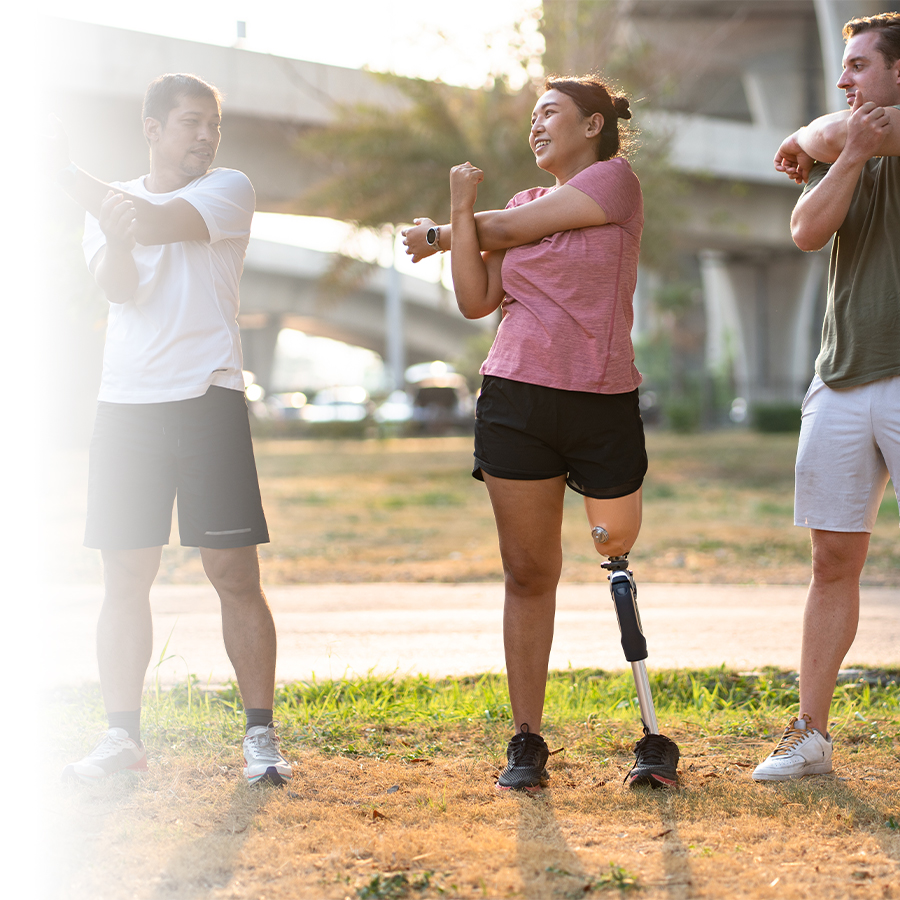Muscle pain, soreness, and cramps—that’s your body telling you that it has worked too hard. Find out how to prevent and relieve these symptoms.
Muscle pain and soreness—signs that mean "stop"
Who hasn’t already felt like they had been run over by a truck following unusually significant physical exertion? Muscle pain and soreness occurs frequently after intense and sustained exertion. It generally appears 12 to 72 hours after exertion and disappears on its own in 2 to 5 days.
Symptoms can be intense and are indicative of the state of fatigue of overworked muscles, which need more oxygen to meet the needs of muscle fibre. This lack of oxygen results in the production of an organic substance called lactic acid. This substance is often at the source of the pain typically felt in the case of overworked muscles. However, the pain felt in the hours or days that follow is mainly due to the inflammation caused by micro-tears in the muscle fibre.
During moving season, for instance, sore backs and other muscle pains are common and are the subject of many consultations at the pharmacy. These symptoms can also be manifested after practising a sport or after physical exertion that requires strength and performance (weightlifting, CrossFit, hockey, triathlon, etc.).
Other possible causes of muscle pain and soreness
Other factors than physical exertion can cause muscle pain and soreness, such as:
- poor posture or workstation organization
- stress
- an illness (i.e. fibromyalgia), and
- certain medications
Ask your pharmacist if the medication you take could have side effects if you have pain, cramps or muscle spasms for no apparent reason. Consult a doctor if symptoms persist.
Relief for muscle pain and soreness
There are various products available at the pharmacy that can help you if you have muscle pain or soreness due to physical exertion.
Analgesics.
These medications can relieve pain and are fast-acting. Some of them are taken orally (i.e. acetaminophen), others are applied locally (cream, ointment, etc.).
Anti-inflammatory drugs.
In addition to providing an analgesic action, these drugs diminishe inflammation, which is often at the source of the pain and soreness. They are very effective and are available in oral and topical form. Most of them are available without a prescription, but some are sold under pharmaceutical supervision and must be obtained from a pharmacist.
Muscle relaxants.
These medications are particularly useful when pain is caused by muscle spasms. They are often combined with an analgesic or an anti-inflammatory agent in the same formulation. Their main inconvenience is that they cause drowsiness.
Over-the-counter medications designed to relieve pain and soreness are not suitable for everyone due to certain contraindications or warnings, the possibility of drug interactions with other medications or the risk of side effects. Always speak to a pharmacist to choose the most suitable product for your needs.
Here are some additional suggestions to help relieve your symptoms:
- Let the affected limb or muscle rest. There’s nothing better than rest to get you back on your feet again.
- Massage the sore muscle without applying too much pressure.
- Relax by taking a nice hot bath.
- Apply cold or heat on the affected area, according to a healthcare professional’s recommendations.
Hot and cold packs available at the pharmacy can prove to be beneficial for muscle pain and soreness.
Prevention for pain and soreness related to physical exertion
For example, if you plan to participate in a move or in physical labour (such as renovations), don’t go about it as though it were a sports competition! Instead, follow this advice:
- Participate in regular physical activity. This will reduce the risk of injury during sustained physical exertion.
- Choose activities that are appropriate to your age, health, and physical condition.
- Adequately warm up and stretch before and after each activity.
- Use tools that will allow you to strain less.
- Stay hydrated by drinking plenty of water.
- Use a support belt for your back.
- Bend your knees and stand up while holding the object close to the body if you must lift a heavy object. Do not hold it at arm’s length.
- Avoid sudden movements. Gradually increase the effort and intensity of the movement.
- Stay alert to the signs that your body sends you when you overstep your boundaries.
- Set aside your pride—this is often what causes the most damage!
Speak to your pharmacist for additional information about muscle pain and soreness, and the ways to prevent or relieve them!

